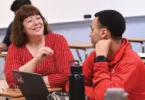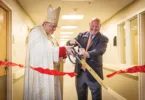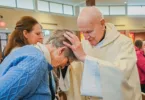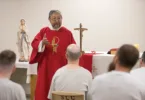
Leaven photo by Todd Habiger
Mike Morrissey, chairman of the case review task force, updates the team July 19 on the issues it’s studying today. A feasibility study identified various needs of the archdiocese, and it is the group’s task to map out strategies for addressing those needs.
by Jessica Langdon
jessica@theleaven.org
KANSAS CITY, Kan. — The time: Lunch hour on a Tuesday.
The place: Savior Pastoral Center in Kansas City, Kan.
The players: Six lay leaders, six priests.
The situation: Under investigation.
Forks and knives were still moving when this group rolled up its figurative sleeves and got down to business.
Today, the topic was how to best reach out to youth in both urban and rural areas across the archdiocese.
It’s a key issue, but not the only one members of this task force are studying. Created by Archbishop Joseph F. Naumann, this group is delving into several issues close to the heart of the Catholic community in northeastern Kansas.
The group has already learned about the need for high school tuition assistance and debt reduction. Members have discussed the assistance required by Donnelly College in Kansas City, Kan., to help make the dreams of higher education come true for many students who might not otherwise have the opportunity. And at the July 19 meeting, the task force talked about new ways to keep hundreds of young people from slipping through the cracks.
And they’re not done yet.
Still to come in the next few months are the topics of maintaining a church presence in urban areas and the needs of the diverse regions and parishes in the archdiocese’s 21 counties.
The blue-ribbon task force brings together leaders in business and faith to study issues identified in a capital campaign feasibility study. The Steier Group, a development firm based in Omaha, Neb., conducted the study in the summer and fall of 2010.
While there was some support for a possible campaign, the Steier Group has said, it was decided that a year in which the leadership could take a new look at the issues was in order.
That’s where the task force comes in. Task force members tackle the issues one at a time, examining where things are going well, where the biggest needs and challenges exist, and what leaders in each of these areas would like to see happen.
It is ultimately their job to come up with recommendations for the archdiocese on how to address these needs.
They then report back their findings to two larger groups — the archdiocesan Presbyteral Council and a case review advisory council.
Lesle Knop, executive director of the archdiocesan office of stewardship and development, is excited about the leadership involved.
This is an opportunity to bring together lay and clergy to focus on “substantive, critical, financial dilemmas” and to address them in a “comprehensive, overarching, integrated manner,” she said.
This isn’t a matter of waiting for someone else to come up with solutions; it’s Catholics taking the lead.
“I am grateful that we’ve had these bright, committed Catholics step forward and give so much of their time and energy to help the church,” Knop said.
A Future Full of Hope and the annual Archbishop’s Call to Share campaigns have addressed many critical needs for Catholics in the archdiocese, but more needs remain.
“We’re looking at extraordinary situations that do require everyone in the archdiocese to look at solutions together,” said Knop. She sees the work these groups are doing as inspirational.
“I think we can all be very excited about this year of work,” she said, adding that it will have a positive impact for many years to come.
Part of the process entails looking at the assets that exist in the archdiocese and using them to their greatest potential.
The task force has more work ahead of it, including more sessions to discuss additional focus areas. Over the next few months, members will meet again to talk about keeping a Catholic presence in urban areas, at which Father Gary Pennings, vicar general, will present information about the changing demographics in Wyandotte County and in Topeka that pressure and challenge the church’s strong presence. The group will also discuss the needs of the regions and parishes within the archdiocese.
In addition to the major focus areas identified, the group will consider other needs, ranging from outreach to lapsed Catholics to establishing multilingual radio communication to sustaining our Catholic youth camp.
The group will ultimately develop a set of recommendations for the archdiocese, which the archbishop and his advisors will use to guide the ultimate decision regarding a potential capital campaign.
But that is in the future — now is the time for research, planning and education.
For the first in a series of stories highlighting each of the major areas of the task force’s efforts, see page 5.






